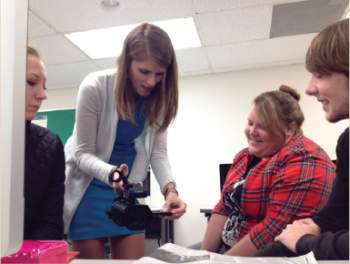Filmmaking for Social Change Class: Conf 795
Filmmaking for Social Change Class: Conf 795
The Filmmaking for Social Change seminar course was born out of the recognition that the peacebuilding and conflict prevention community needs to better engage with media in order to significantly impact how conflict is represented globally. Traditionally, the field has not placed great emphasis or importance on engaging with traditional media or creating it. We as conflict practitioners have the capacity to provide a unique perspective that is underrepresented in mainstream news and documentary film. Much of the work currently being produced in the field is presented to the public in the form of reports and journal articles. Film could make our work come to life by allowing the audience to connect to the issue on a personal and emotional level. Media has an ever-expanding presence in our lives. It can be utilized to document human rights abuses, shed light on injustice, elevate a social movement, or even unite the global community. It doesn’t need to be shot on the highest quality camera or edited with the nicest equipment to create change. Students leaving S-CAR should be equipped with these fundamental skills in order not to only support their own initiatives but also to train others to do the same.
Much of the work currently being produced in the field is presented to the public in the form of reports and journal articles. Film could make our work come to life by allowing the audience to connect to the issue on a personal and emotional level. Media has an ever-expanding presence in our lives. It can be utilized to document human rights abuses, shed light on injustice, elevate a social movement, or even unite the global community. It doesn’t need to be shot on the highest quality camera or edited with the nicest equipment to create change. Students leaving S-CAR should be equipped with these fundamental skills in order not to only support their own initiatives but also to train others to do the same.
Professor Michael Shank has pushed for this partnership persistently, leading courses at S-CAR on Writing for the Media, as well as engaging directly by writing and speaking extensively for mainstream news outlets like The Washington Post, CNN, FOX and many others. Danya Hakeem, a graduate of the masters program at S-CAR and a freelance media producer, has been producing films for National Geographic and local grassroots organizations worldwide that support coordination between media and the peacebuilding community. They both recognize that media is a powerful medium for effecting social change and have been collaborating for nearly a year to make this initiative happen.
This course is unlike any offered in the S-CAR or Communication curriculum as it emphasizes peacebuilding and social change principles while providing students with practical hands-on skills in filmmaking. Having completed the course, the students will have learned proper storytelling techniques and essential technical skills including videography, lighting, audio recording, and editing. We want students to understand the importance of completing a thorough research assessment, including conflict mapping and stakeholder analysis to better assess their approach, timing and audience. Additionally, in order to encourage engagement and action on an issue and thus create lasting social change, we emphasize the importance of developing partnerships with peacebuilders and NGOs specializing in the issue.
We recognize that the fastest way to learn to create a film is through practice and experimentation, so students are required to create a short film as their final assignment. While we know that it is impossible to learn everything there is to know about filmmaking for social change in two full-day sessions, our goal is for students to leave feeling comfortable with the fundamentals on how to conceptualize, research, film, edit, distribute, and evaluate their own film. Students will be able to utilize these skills to create not only video, but print media as well. So far, the class has met for one session and the reviews have been extremely positive, with one student going as far as to say, “Thanks for one of the most enthralling classes I’ve taken to date.” We hope S-CAR continues to support initiatives that combine media and peacebuilding in both a practical and theoretical way. Professor Shank and Danya Hakeem plan to continue their partnership through course offerings and organizational workshops for all ages and experience levels.




